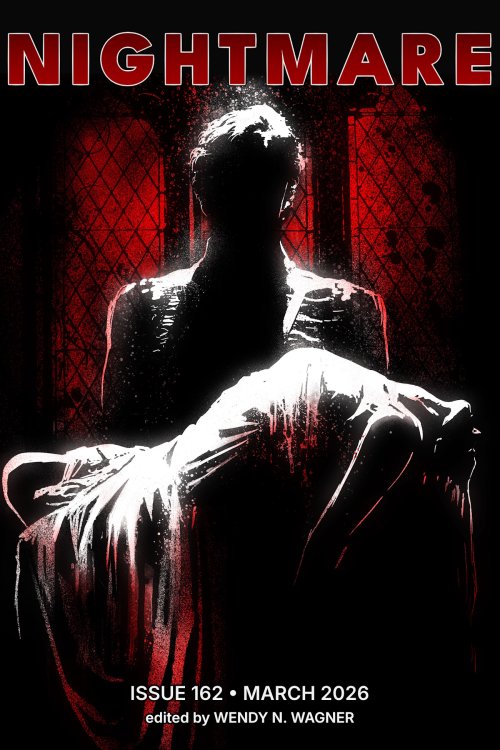CW: discussion of suicide, depression. (Included by author’s request.)
I think the most chronically online thing about me is that I’m a moderator on the r/horror and r/horrorlit subreddits, and it’s fun (mostly) to poke around and see what interests readers:
My list of TRULY SCARY books [Tag: Discussion]
Books that gave you legit nightmares? [Tag: Recommendation Request]
What’s a book that’s actually scary? [Tag: Recommendation Request]
Petition to make a sub rule against “what’s a book that’s actually scary?” posts. [Tag: Discussion]
Most people who are asking for recommendations for terrifying books are bound to be disappointed. Responses to these posts germinate an exhaustive discourse around the subjectivity of fear but—it’s intriguing—there are little gems that pop up sometimes with the raw energy that seems to grip everybody by the throat. Most recently Steven L. Peck’s A Short Stay in Hell has seen a monumental rise in readers, which is . . . strange?—because the book was first published in 2011. We love BookTok, we all pray for our own Bigolas Dickolas to swoop in and lift our stories off to bestseller lists, but of course the work has to stand on its own two feet—it’s gotta be good, at least to someone. And A Short Stay in Hell is very, very good. So good, it’s reached a largely united consensus online: that shit is scary.
A Short Stay in Hell is about a man who dies—he gets sent to the office of this mirthful demon in a high-backed red leather chair, where he’s told he’s going to hell. Not capital H “Hell,” mind you, not the eternal flames that Dante had envisioned, but his own personal hell. Tailored—just for him! Neat!
And since he’s an academic and all that, what more suitable place to send him than a library? How thoughtful. And he can leave (wow, maybe hell gets a bad rep?), if he finds the book about the story of his life—except, oh, one minor little thing we almost forgot to mention? This library is a spire consisting of millions upon millions of books, most of which are gibberish, so good luck finding that book about your life. Oh, and since you’re already dead, don’t try to cheat the system—if you die here, you’ll just respawn. Hope you enjoy your short stay in hell! Au revoir!
And so what is it about this story that scares readers so much? Our narrator’s already dead. What harm can really come to him?
Here’s where I want to wager a bet: what you’re actually scared of—existentially—isn’t death, but the space between, somehow; the vacuous threat of being trapped someplace forever. Bored. Rote. Stagnating, restricted. Ad infinitum. Dwelling in Sartre’s No Exit; Harlan Ellison’s I Have No Mouth and I Must Scream; or Stephen King’s The Jaunt. How long have you been trapped here? “Longer than you think! Longer than you think!”
Liminal spaces sit like Hill House: Waiting. Inhospitable. Wrong. The essence of liminal space is that it’s transitory, where past and future assert themselves onto the present. Sometimes it’s an experience, like grief after a loss, or war, or getting sick; other times, it’s a physical space as in hallways, airports, and malls. What connects these threads is that liminal space exists for what comes before or after. We assume change is always likely, unavoidable even—celestial spheres move across the heavens, tides rise and fall—so what happens when we ensconce ourselves there? What happens when we linger in a space that’s meant to be transitional?
Of course, we all got an (unwilling) taste of exploring the meaning of this during lockdown—how this sense of crisis changes our lives in some ways, and in other ways, doesn’t change anything at all.
And it felt odd, but familiar, this sense of unease. It felt like something I’d experienced in fits and spurts throughout my whole life. It felt like depression.
Allow me to connect two things in my life for you—I promise they’re related:
1. I adore horror.
2. I am a book fetishist (affectionately nabbing this term from John Langan), so I have many, many shelves full of books. One of those shelves is special to my favourites.
There are thirteen books on that shelf.
Seven of them are about suicide.
None of these are speculative. They’re quite grounded in reality. I haven’t encountered very much in terms of liminality as a tangible physical location through text, it’s mostly been relegated to the worlds of visual mediums: creepypasta images, video games, and film aesthetics. And liminal space is such a fitting allegory onto which we can graft so many things, isn’t it? A pandemic lockdown, a gender transition, an illness. Rites of passage and stages of grief. We can take any sort of inner situation and extrude it to a literal space. No demons here, no ghosts. There’s a haunting, perhaps, but that haunting is you. In that transitory space between action and consequence.
What draws me, and so many of us, to horror is the ability to shrink down the large and often unfathomable existence of so much trauma and violence—fascism, police brutality, transphobia—into dimensions with a face and a weakness. A place where wooden stakes and silver bullets can protect us.
So what do you suppose we do if our demons don’t take the form of a monster?
In this, I think of an old tweet from Gretchen Felker-Martin, in which she spoke of artists overwhelmingly framing depression as a dark cloud or shapeshifting monster and if you’ve ever been in the throes of a depressive episode, it certainly doesn’t feel as though it takes the shape of those things. It feels like this . . . immense, comfortless concrete space that endlessly expands. I know that because I’ve been there.
Back to the books on suicide. Life is always composed and orchestrated to convince us of something. I wondered recently what it was about this that drew me so much to these books?
In seeking to understand myself, I wrote a novella, Coup de Grâce. In it, a man sets out to drown himself, but his plan is foiled when he finds himself trapped in an expanding labyrinthian subway station with no apparent exits.
There are few truth-telling traditions in this society more powerful than horror. Coup de Grâce was certainly my love letter to anomalous architecture, and the genre at large, but it was also my personal way of exploring liminal space as an existential concept.
What do we do when the horror isn’t an “us vs. them” or “man vs. nature,” but a “me vs. myself”? Me versus my body, my lived experience. Ultimately: who will protect me from myself?
Much like grief, depression doesn’t go away or disappear. They both fester and in many cases withdraw to spaces you will resist again and again.
Often when we are suffering, we bridle against the help and support of others. There’s something very animal about suffering where we tend to isolate. We don’t want to bother anyone. We have others relying on us: pets, kids, friends, colleagues, and we wear a mask in order to preserve these relationships. Because of that, we’re lonelier than ever, marching through the blank, grey halls of what feels like an infinite landscape. It’s hard not to feel othered.
Lately, I’ve been feeling better. Lately, I’ve been thinking: maybe being in that space isn’t so bad, or at least it isn’t as lonely as we think it to be.
It’s big, sure, but there are others that are there. Have been there. There’s evidence of this, in liminal space, the sense that you’re coming into a recently deserted room where the curl of smoke lifts off a cigarette that’s just been ashed, or a needle skips as it reaches the end of a vinyl record.
We’re not alone. Others have gone through the spaces we feel trapped in and have come out the other side. I think that’s why I navigated so much towards all those books about suicide on my shelf. What I sought in those pages was connection—to see myself in something. Sometimes in a broken heap, other times able to be saved. These books stand proudly there like a picket line; a reminder to me that there is solidarity in suffering. These experiences are not unique to us. With compassion and hope and the warmth of others we can come out on the other side.
To quote my equally chronically online partner: the horrors persist but so do we.









